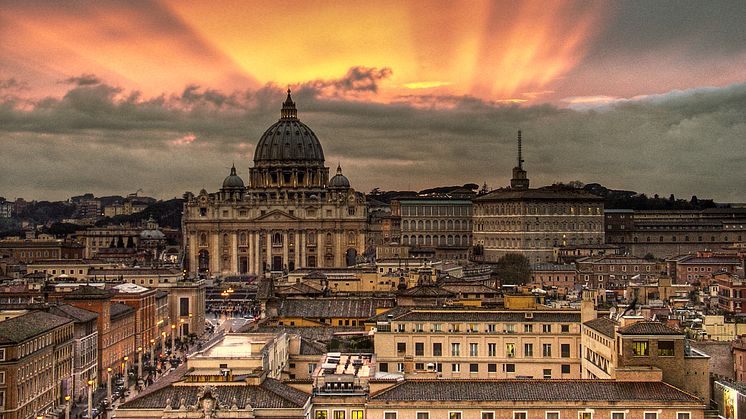
News -
IP Spotlight: Taking God to court
We’ve all heard of large companies being accused of idea theft by independent innovators and smaller brands, but what happens when the alleged perpetrator is a religious institution?
This is the situation Rome street artist Alessia Babrow has been grappling with. Last year, she discovered that a stylised image of Christ she had created and glued onto the Ponte Vittorio Emanuele II bridge near the Vatican in 2019 had been reproduced without her permission — by the Vatican itself.
The image had been used on the Vatican’s 2020 Easter postage stamp; a Rome street art photographer had spotted it and informed Babrow, who recognised the image largely due to her signature heart symbol on Christ’s chest.
She proceeded to sue the city-state’s telecommunications office in May this year for misinterpreting the intention of her artwork, and illegally profiting from her creation. Babrow is seeking almost €130,000 (US$160,000) in damages but according to the lawsuit, the Vatican has not responded.
What, where and why
Babrow’s piece is a 35 cm-high printed picture of Christ inspired by the work of 19th century German painter Heinrich Hoffman, bearing her signature image of a human heart with her initials and the phrase “just use it” across it. She created the image in February 2019, after which she glued it onto a marble wall of the main bridge leading to the Vatican, as well as around a dozen or so other locations in central Rome.
Part of the artist’s Just Use It project that began in 2013, the artwork is one of a series of works plastered on walls and bridges in Rome. These works all feature similar hearts emblazoned on religious figures, including Buddha, the Virgin Mary, and Ganesha.
According to the lawsuit, the image of Christ Babrow had created was later printed by the Vatican on 80,000 stamps, sold at €1.15 each. As recently as the beginning of June, the stamps and a commemorative folder were still being sold at the Vatican post office, and displayed at the cashier counter as a promotional item.
Babrow’s concept for the project is to “promote the intelligence and the brain of the heart”, implying that there are no universal truths. Her lawyer Mauro Lanfranconi stated that the Vatican’s appropriation of the artwork has “irrevocably distorted” the artist’s message.
Babrow said she reached out to the Vatican and in response, was invited to meet with the pope and offered free stamps instead of monetary compensation, which she turned down. She sent three letters to the Vatican requesting recognition of her copyright but received no reply and decided to take legal action.
The Vatican’s numismatic chief, Massimo Olivieri, claimed that he saw the artwork, took a photo of it and decided to use it on the Easter stamp to attract a “new generation of stamp enthusiasts”.
Regarding the allegations, Olivieri has said the stamp office will not comment on the lawsuit, and the Vatican press office has also turned down requests for comment.
Babrow told The Associated Press that she was shocked as this was something people “don’t expect certain things from certain organisations”.
Holy irony
This controversy has served to highlight a great irony: while the Vatican is being sued over alleged idea theft, it has long strictly enforced its own copyright over many things, including the Sistine Chapel and the Pope’s words.
In fact, the Vatican’s publishing house has demanded royalties from the authors of books containing Pope Benedict XVI’s homilies, while the Vatican Museums requires the copyright of images from media outlets reporting on events in the museum.
While street art or “guerrilla” art like Babrow’s may not enjoy the same protection as other types of art in many parts of the world, IP law in the US and throughout most of Europe protects artists’ rights regardless of how their works are made or where they are displayed.
Furthermore, considering that the commercial activity involved happened in Italy, the Vatican’s sovereign status is unlikely to shield it from an Italian court’s jurisdiction.
PitchMark approached Brabow for comment, and while she was unable to reveal anything on the ongoing lawsuit, she said: “I can tell you my opinion: today, we live in a digital world and copyright laws change depending on the country or state.
“Filing an international lawsuit is very expensive and not everyone has the opportunity to do so. We need a system that is affordable for and protects everyone in the same way, regardless of where the crime was committed.
“The real problem is not legal but ethical: just don't steal.”




